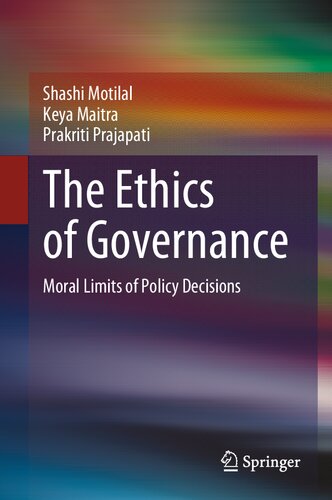

Most ebook files are in PDF format, so you can easily read them using various software such as Foxit Reader or directly on the Google Chrome browser.
Some ebook files are released by publishers in other formats such as .awz, .mobi, .epub, .fb2, etc. You may need to install specific software to read these formats on mobile/PC, such as Calibre.
Please read the tutorial at this link: https://ebookbell.com/faq
We offer FREE conversion to the popular formats you request; however, this may take some time. Therefore, right after payment, please email us, and we will try to provide the service as quickly as possible.
For some exceptional file formats or broken links (if any), please refrain from opening any disputes. Instead, email us first, and we will try to assist within a maximum of 6 hours.
EbookBell Team

0.0
0 reviewsThe Ethics of Governance: Moral Limits of Policy Decisions offers a toolbox drawn from normative ethics which finds applications in public governance, primarily focusing on policy making and executive action. It includes ethical concepts and principles culled from different philosophical traditions, ranging from more familiar Western theories to non-Western ethical perspectives, thereby providing a truly global, decolonized and expanded normative lens on issues of governance. The book takes a unique and original approach; it demonstrates the use of the ethical toolbox in the context of actual examples of governance challenges.
Taking three major case studies each representing an aspect of human-human and/or human-nature and/or human-animal relationship, the book attempts to show the significance of public practical reasoning in policy decisions with the aim of arriving at reasonable responses. Acknowledging the challenges that policy makers often face, the book highlights the fact that policy making is hardly an exercise yielding a black-or-white solution; rather it involves finding the most reasonable normative outcome (course of action) in a given situation, especially employing an expanded understanding of values including well-being, sustainability, interdependence and community. This effort that helps bridge the gap between ethical theorists and policy practitioners exemplifies the necessary role of ‘engaged philosophy’ in public governance.
In the major case studies, Boxes offer facts and figures along with pertinent ethical questions that have been raised and discussed. Aiming to aid the engagement of a diverse audience including non-philosophy readers, each chapter also includes Boxes containing examples, shorter case studies, at-a-glance charts, and tables with comprehensive ethical tools for a quick recap.